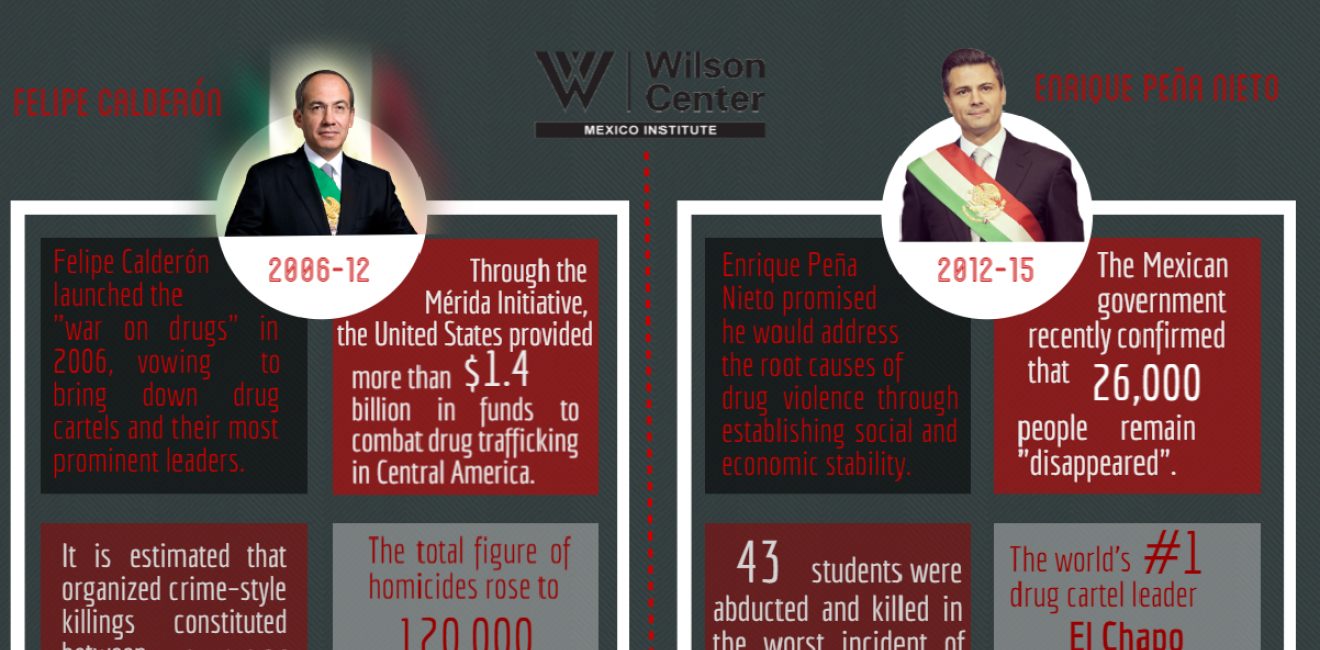Security Strategies to Combat Drug Violence in Mexico
This infographic compares President Enrique Peña Nieto and former president Felipe Calderón's security strategies to combat drug violence in Mexico.
This infographic compares President Enrique Peña Nieto and former president Felipe Calderón's security strategies to combat drug violence in Mexico.

The recent escape of the world’s most infamous drug lord Joaquín El Chapo Gúzman from a maximum security prison in Mexico has come as a major embarrassment to the Mexican government at a time when the public has already voiced serious discontent and doubts about the effectiveness of Enrique Peña Nieto’s security policy. The Mexican president had been trying to shift away from his predecessor’s much criticized hard-line strategies and pursue a more sustainable solution to tackle drug-related violence and public insecurity in the long term.
Former president Felipe Calderón came to power in 2006 and, assisted by the United States, launched what became known as the ”war on drugs”, a large-scale military operation aimed at cracking down on drug cartels and their most high-ranking leaders. Calderón deployed federal troops to his home state Michoacán as well as various other states such as Tamaulipas, Tabasco and Guerrero. Local police officers had to surrender their weapons, and many were arrested on suspicion of allegiance with drug cartels. The operation also included the seizure of arms, vehicles destined for drug transport, as well as large amounts of cocaine and marijuana. More than a dozen prominent drug barons were arrested in an attempt to curb the power of the cartels. Calderón’s security strategy has since come under intense scrutiny, as many have criticized his top-down approach as the cause for the spike in violent deaths in the following years. While his military campaign significantly weakened and fragmented some major drug trafficking organizations, such as the Gulf and Sinaloa cartels, the balance of power among cartels was disrupted, creating bloody battles for dominance among former allies and newly emerged cartels seeking to manifest themselves in the power vacuum. The war on drugs is believed to have cost the lives of more than 70,000 innocent victims, many of whom remain missing until this day.
Faced with spiralling levels of violence upon taking office in 2012, the then newly elected President Enrique Peña Nieto vowed to make the reduction of violence and re-establishment of public security his primary political objective, and to address not just crime but its underlying social causes. He admitted to problems related to public trust in security forces, caused by wide-spread corruption and involvement of police officials in illicit activities. The prime attention of the new administration was thus intended to be focused on strengthening the economy and law enforcement agencies, which President Peña Nieto believed would prove a more viable, bottom-up approach to reduce the power of drug trafficking organizations in the country.
On the ground, however, the president’s efforts have shown to make little difference to the status quo of ongoing violence and the pervasive influence of drug cartels. A major blow to the administration’s security policy and public credibility was the abduction and killing of 43 students in late 2014, an incident that evolved into a major political crisis as hundreds of thousands of citizens took to the streets, demanding full disclosure of information from the government. Although nearly a hundred suspects have been arrested, many of whom were public officials, to this date the administration has failed to take a clear stance and sufficiently prosecute those to be held responsible. It remains to be seen whether President Enrique Peña Nieto and federal authorities will handle the escape of ‘El Chapo’ in a better fashion, fully and truthfully disclosing all facts and developments to the Mexican public and cooperating authorities in the United States.

The Mexico Institute seeks to improve understanding, communication, and cooperation between Mexico and the United States by promoting original research, encouraging public discussion, and proposing policy options for enhancing the bilateral relationship. A binational Advisory Board, chaired by Luis Téllez and Earl Anthony Wayne, oversees the work of the Mexico Institute. Read more


